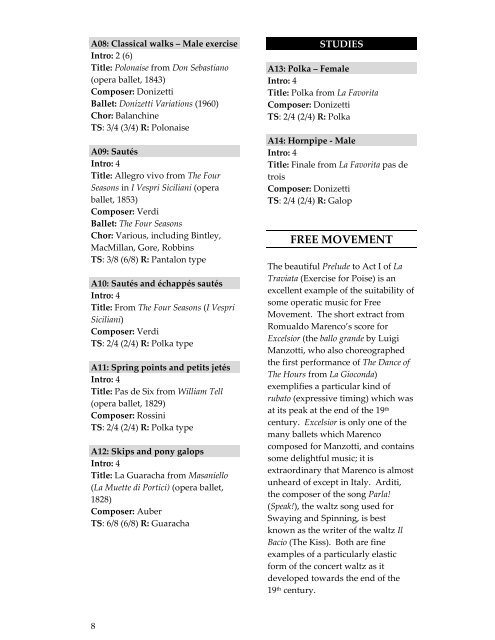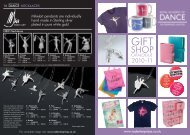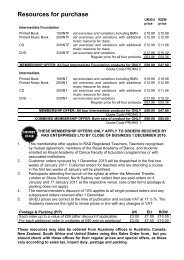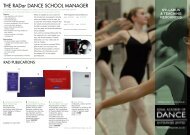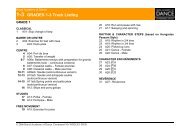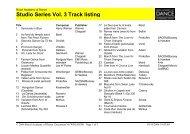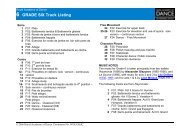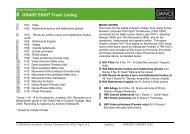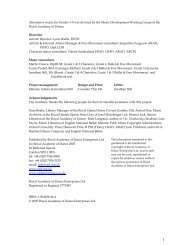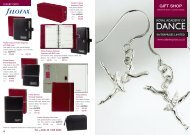Music in Focus guidebook to Alternative Music for Grades 1-3
Music in Focus guidebook to Alternative Music for Grades 1-3
Music in Focus guidebook to Alternative Music for Grades 1-3
Create successful ePaper yourself
Turn your PDF publications into a flip-book with our unique Google optimized e-Paper software.
A08: Classical walks – Male exercise<br />
Intro: 2 (6)<br />
Title: Polonaise from Don Sebastiano<br />
(opera ballet, 1843)<br />
Composer: Donizetti<br />
Ballet: Donizetti Variations (1960)<br />
Chor: Balanch<strong>in</strong>e<br />
TS: 3/4 (3/4) R: Polonaise<br />
A09: Sautés<br />
Intro: 4<br />
Title: Allegro vivo from The Four<br />
Seasons <strong>in</strong> I Vespri Siciliani (opera<br />
ballet, 1853)<br />
Composer: Verdi<br />
Ballet: The Four Seasons<br />
Chor: Various, <strong>in</strong>clud<strong>in</strong>g B<strong>in</strong>tley,<br />
MacMillan, Gore, Robb<strong>in</strong>s<br />
TS: 3/8 (6/8) R: Pantalon type<br />
A10: Sautés and échappés sautés<br />
Intro: 4<br />
Title: From The Four Seasons (I Vespri<br />
Siciliani)<br />
Composer: Verdi<br />
TS: 2/4 (2/4) R: Polka type<br />
A11: Spr<strong>in</strong>g po<strong>in</strong>ts and petits jetés<br />
Intro: 4<br />
Title: Pas de Six from William Tell<br />
(opera ballet, 1829)<br />
Composer: Ross<strong>in</strong>i<br />
TS: 2/4 (2/4) R: Polka type<br />
A12: Skips and pony galops<br />
Intro: 4<br />
Title: La Guaracha from Masaniello<br />
(La Muette di Portici) (opera ballet,<br />
1828)<br />
Composer: Auber<br />
TS: 6/8 (6/8) R: Guaracha<br />
8<br />
STUDIES<br />
A13: Polka – Female<br />
Intro: 4<br />
Title: Polka from La Favorita<br />
Composer: Donizetti<br />
TS: 2/4 (2/4) R: Polka<br />
A14: Hornpipe ‐ Male<br />
Intro: 4<br />
Title: F<strong>in</strong>ale from La Favorita pas de<br />
trois<br />
Composer: Donizetti<br />
TS: 2/4 (2/4) R: Galop<br />
FREE MOVEMENT<br />
The beautiful Prelude <strong>to</strong> Act I of La<br />
Traviata (Exercise <strong>for</strong> Poise) is an<br />
excellent example of the suitability of<br />
some operatic music <strong>for</strong> Free<br />
Movement. The short extract from<br />
Romualdo Marenco’s score <strong>for</strong><br />
Excelsior (the ballo grande by Luigi<br />
Manzotti, who also choreographed<br />
the first per<strong>for</strong>mance of The Dance of<br />
The Hours from La Gioconda)<br />
exemplifies a particular k<strong>in</strong>d of<br />
ruba<strong>to</strong> (expressive tim<strong>in</strong>g) which was<br />
at its peak at the end of the 19 th<br />
century. Excelsior is only one of the<br />
many ballets which Marenco<br />
composed <strong>for</strong> Manzotti, and conta<strong>in</strong>s<br />
some delightful music; it is<br />
extraord<strong>in</strong>ary that Marenco is almost<br />
unheard of except <strong>in</strong> Italy. Arditi,<br />
the composer of the song Parla!<br />
(Speak!), the waltz song used <strong>for</strong><br />
Sway<strong>in</strong>g and Sp<strong>in</strong>n<strong>in</strong>g, is best<br />
known as the writer of the waltz Il<br />
Bacio (The Kiss). Both are f<strong>in</strong>e<br />
examples of a particularly elastic<br />
<strong>for</strong>m of the concert waltz as it<br />
developed <strong>to</strong>wards the end of the<br />
19 th century.


